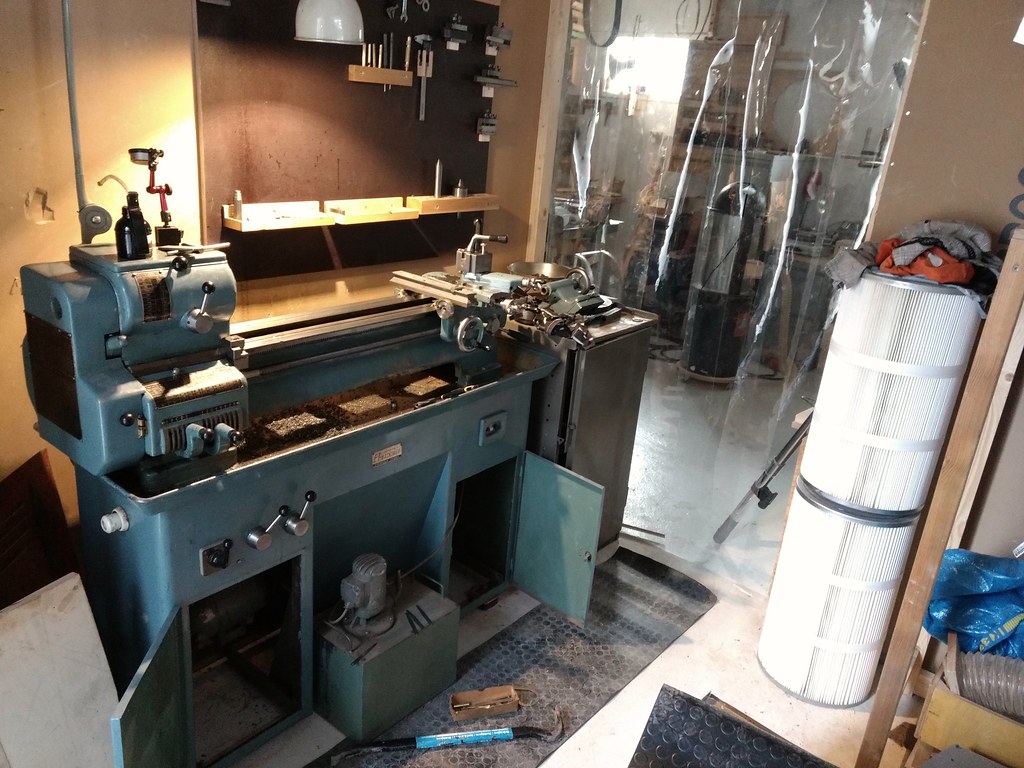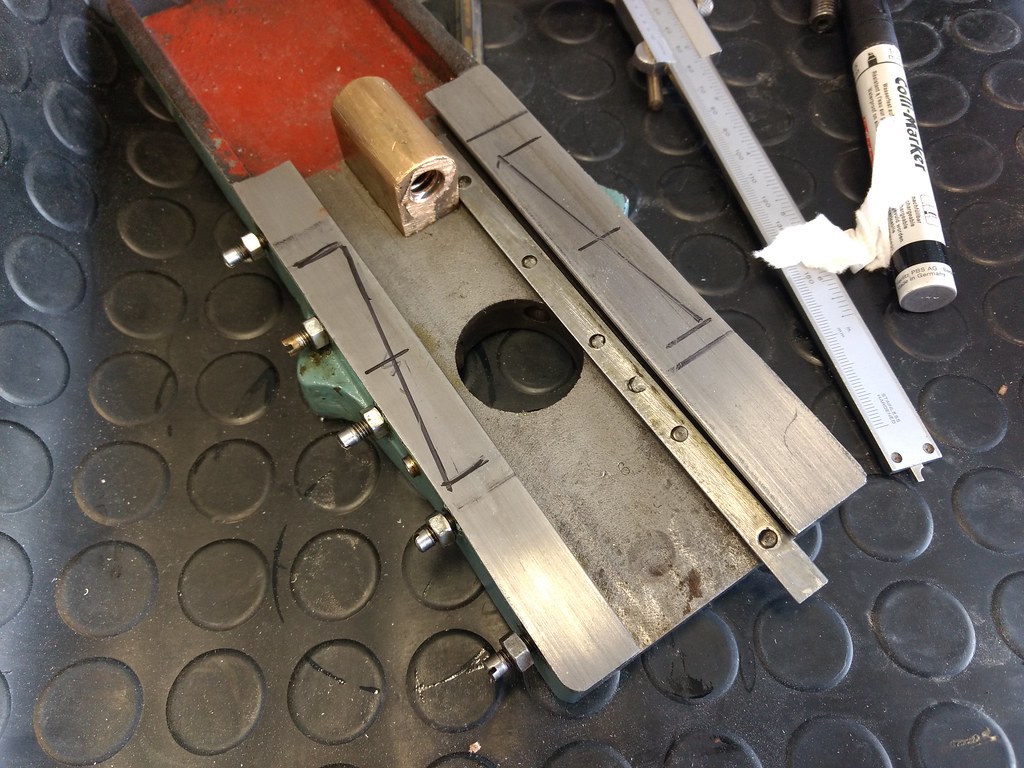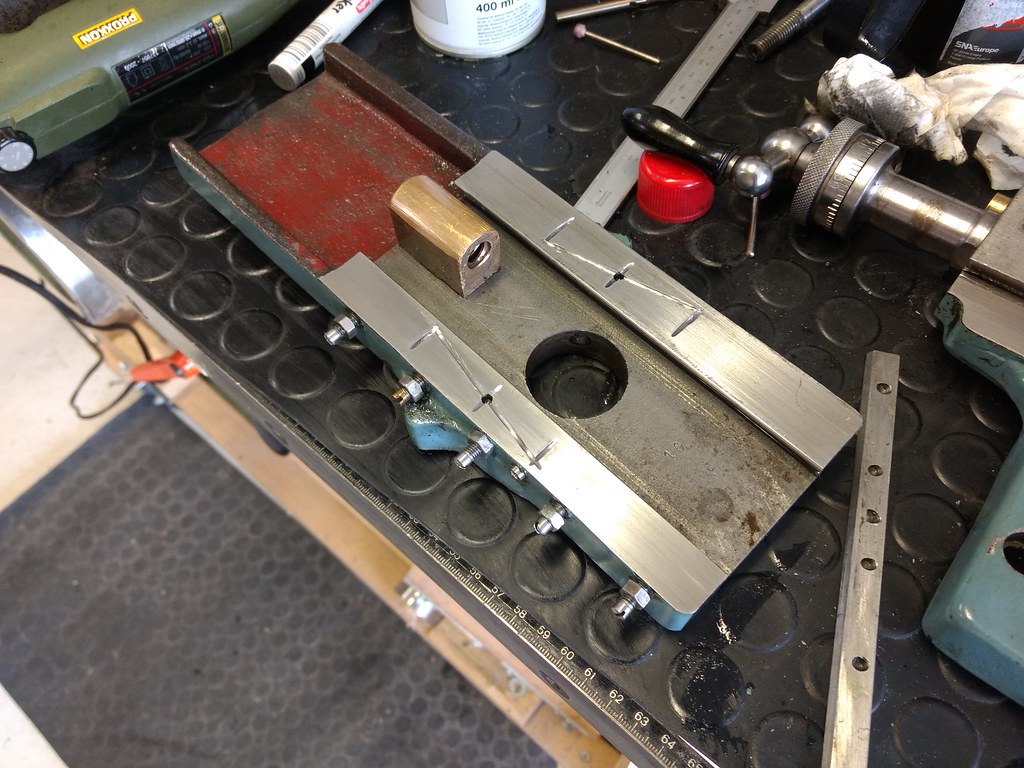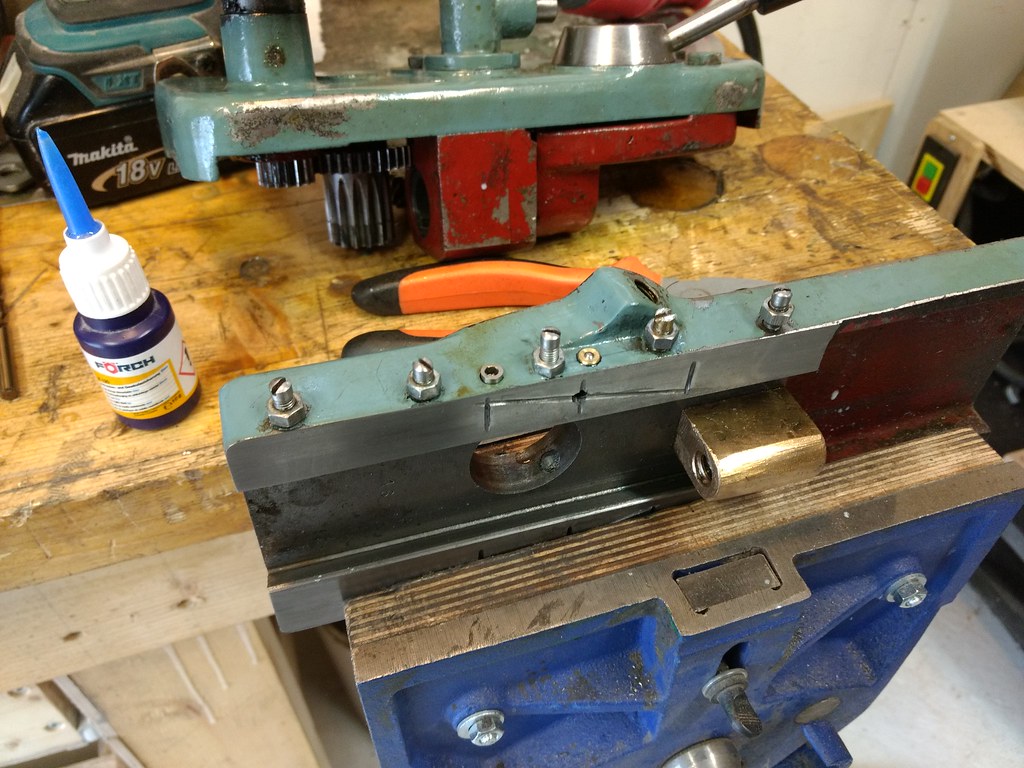|
gently caress all that there's more money in automation programming and you'll get to keep your finger and knee cartilage.
|
|
|
|

|
| # ? May 25, 2024 16:26 |
Pagan posted:So the question is this : Should I switch careers? I keep reading articles about how the trades in the US pay well and can't hire people fast enough. Do I go to my local fabrication shop and say "I have no work experience but I'm not an idiot; you should hire me!" or am I being irrationally optimistic? If you hate your current occupation, have a knack for a new one, and can find work, why not? Though like IGA said, learn you some SCADA, ladder, C#, and program automation equipment. Now add that to a strong mechanical base and you're quite desirable in the job market. Some people say "find a job you love and you'll never work another day in your life." I call bullshit. A hobby, that you can enjoy, is completely different once you need to make money doing it, on someone elses time. Welding is fun and cool until you do the exact same gear housing for eight months. 
|
|
|
|
|
Come run some waterjet machines But yes working with metal or whatever every day is a lot different than doing it as a hobby.
|
|
|
|
Pagan posted:Serious question here. I've been an IT guy my whole life and don't really like it. I got laid off, and I've been putting a lot of effort into blacksmithing, welding, etc. I'm getting halfway decent at it, despite not having gone to a tech school or voc school. I've taken classes through New England Blacksmiths, I've also worked a few months at a production shop making things like railings, fire screens, and household items like hooks and such. However, I've never worked full time for months on end as a welder or fabricator. Where I work now there are a lot of very talented machinists who can't work a computer to save their life. I came in as a computer nerd who didn't know poo poo about machining. 5 years later I'm writing programs for multiple machining centers. I got very lucky though. I showed up at a shop that needed what I could do and was happy to train me on the machining side. N+1 about turning a hobby into a job. I was a mechanic before because I liked cars in highschool. Doing it for a living sucked all the joy out of it.
|
|
|
|
Pagan posted:Serious question here. I've been an IT guy my whole life and don't really like it. I got laid off, and I've been putting a lot of effort into blacksmithing, welding, etc. I'm getting halfway decent at it, despite not having gone to a tech school or voc school. I've taken classes through New England Blacksmiths, I've also worked a few months at a production shop making things like railings, fire screens, and household items like hooks and such. However, I've never worked full time for months on end as a welder or fabricator. If you're in Canada? Can't hurt, depending on the trade. There's a lot of welders and pipefitters looking for work right now (oilfield crash wooo), but fabricators and machinists are always needed. That said, keep it as a backup plan. Do not make it your main line, don't get your hopes up. I don't know about fab shops, but machine shops are very, very leery about hiring people who don't have their 2nd year or someone at the shop to vouch for them. I'd heavily advise keeping with your IT thing until you have at least a basic set of quality tools and some training from a community college or something similar. Ain't no reason to throw caution to the wind when you can have work that pays decently again fairly soon. For 'murica, I got nothing, aside from what the goons before me said. If you're IT, and you've only done IT your entire life, doing shop work is gonna be some serious culture shock, and the work is gonna be kinda brutal in comparison. I'm a dumbass, I like physical work, and I grew up with it. It's really, really not for everyone. By the time you can retire you'll be several years older than most IT people, you'll look 10 years older, and you'll feel 20 years older.
|
|
|
|
Regarding getting into manufacturing- This is US specific (Pagan is in US). I've worked in the same machine shop since junior year of high school. I had zero experience, and I've now been doing it 17 years. I've personally seen maybe 30-40 people come and go where I am (it's a smaller place, 13ish employees). I also deal directly with a lot of our customers. Probably the biggest problem us and all the other shops I deal with is finding good help. Not even people with experience. Just people who will show up to work every day and take direction. I know for a fact that if someone came in and actually expressed specific interest in working in a machine shop, and knew what a lathe or Bridgeport was, we wouldn't hesitate to hire them, and I know the vast majority of shops around here would also. Obviously the starting pay would be a lot less than most IT jobs. But there is potential to make a good living. It really depends on where you work, but, again, we are a pretty small shop and I make close to six figures working 50 hours a week. I also don't necessarily agree with it aging you. Yes, some manufacturing sectors are pretty tough. But a precision machine shop is not that kind of work at all. Yes it can get stressful at crunch time, but you're going to see that in most job environments. This is why I was complaining earlier in the thread about there not being any certification process for machinists here. It would be so much easier to actually find people who want to work. It would also probably help increase awareness of the trade in general, because in my experience most people under 50 do not know what a machinist does.
|
|
|
|
Ugh, darn it, you're making me want to try to switch from engineering to machining. Probably not seriously, I'm in too deep at this point.
|
|
|
|
mekilljoydammit posted:Ugh, darn it, you're making me want to try to switch from engineering to machining. Probably not seriously, I'm in too deep at this point. DO IT! Give me hope! I shall live through you!
|
|
|
|
mekilljoydammit posted:Ugh, darn it, you're making me want to try to switch from engineering to machining. Probably not seriously, I'm in too deep at this point. Let's start a machine shop! *Sits here cursing his overly decently paying IT job with benefits* I'm not sour, I SWEAR.
|
|
|
|
the spyder posted:Let's start a machine shop! Yeah, but which of us is moving? OK, I'm just really bitchy about how badly I'm getting screwed on salary and my job not mattering because the factory doesn't feel like actually improving...
|
|
|
|
Similar to the warnings about turning a hobby into a job, remember that the grass is always greener on the other side. I spend a lot of my day dealing with bullshit that isn't my fault at work. Prints that are missing dimensions, prints that are 4 decimal places for every feature, prints that are 3 decimal places on every feature when clearly some should be two and some should be four, prints missing dimensions entirely, parts that were supposed to finish that are already so wildy outside tolerence we can't salvage them, stock that's the wrong size, it just goes on and on. I'm not allowed to take pics at work or be specific, I wish I could because theres a lot of great conetent I'd love to share, but it's not worth risking my job. I do love my job but it can be frustrating as all hell some days. Fake edit: prints missing dimensions stays in twice because that poo poo happens all the time.
|
|
|
|
A Proper Uppercut posted:Regarding getting into manufacturing- My local shop (who you know) says the same thing. Reliable help is tough to find. Finding CNC operators is relatively easy, but they don't usually last long for a variety of reasons. Finding good manual machinists who can hold the tolerances that my products need in the materials that I use is REALLY tough. 80% of the manual shop are 60+ years old. There's plenty of jobs, and the pay is pretty decent, considering the required schooling. However, pay is VERY dependent on location. We're in Southeastern MA, one of the highest COL areas in the country. You (and I) do a lot of work for high-tech industries, who pay top-dollar for parts. Pagan is in RI, so I imagine pay would be similar, but slightly lower. If you learn to program a specific flavor of controller, and really know your feeds/speeds, you could easily make six figures working 40-50 hours a week in a high-volume CNC shop. However, it's not easy work, and mistakes are costly. I know a certain Boston-area shop that ate a $4,000 piece of material because of a broken tool, and that's not even that bad of a mistake. If you can do a bunch of useful stuff (TIG welding especially combined with machining), you should do OK at first. Just don't hesitate to ask questions, and listen/take notes. The old timers want to share their knowledge and experience. Other info: http://www.bls.gov/oes/current/oes514041.htm https://www.bls.gov/oes/current/oes172141.htm https://www.bls.gov/oes/current/oes151151.htm Machinists, on US-average, make $5/hour less than Computer User Support Specialists, and less than HALF what Mechanical Engineers make. And yes, grass is always greener, etc. It's a tough career, especially at first, but I can see it being incredibly rewarding. Or you know, make decorative stuff and sell it on Etsy/Instagram/Facebook. I know a couple of people doing really well in the decorative metalworking scene.
|
|
|
|
I'm in IT too and kinda hate it, though a lot of it is my boss who I can't stand from time to time and now is one of those times I feel like punching his face. But I've been here holy poo poo 18 years. I feel like I missed the window of opportunity to move along to another job which I didn't because the world economy crashed right about then. I mean it's just me in a small company of 10 people or so. I feel my skills are probably not anywhere as honed as they could have been if I jumped to another job that would be more specialized. I am a do it all kinda guy now, everything from inDesign to coding to admin stuff. I worked in a packing factory in my teens and swore I'd never do repetitive work like that again, I am very certain I could not hack it as a welder or machinist, I don't like working around other people or with them looking over my back and doing it as a job would kill my interest in it. So at this point I feel like I am gonna keep on doing this job until I retire, or the company goes under, or I get fired and then I'll see if anyone else wants to hire me, though I am nearing 40 now. At least I got my own office.
|
|
|
|
Thanks for the scraping pics... I think I am finally getting better, bit by bit. I have an opportunity to buy one of these - http://www.graysonline.com/lot/0009-3013996/engineering-and-toolmaking/herless-tool-and-cutter-grinder - can you use this sort of machine to make parallels and grind small parts? I know very little, just that they can sharpen end mills.
|
|
|
Mudfly posted:Thanks for the scraping pics... I think I am finally getting better, bit by bit. That's pretty much for fluted stuff, reamers, end mills, etc. I'm sure with enough loving about you could make it grind a parallel but it probably won't do a very good job of it.
|
|
|
|
|
sharkytm posted:*grass is greener talk* Poking the job boards, it wouldn't actually be that much of a pay cut... hourly equivalent for relatively entry level machinist jobs is around 75% of what I'm making, but I'm salary so no opportunity for OT or anything. This is probably more a testament to how badly I'm getting boned for compensation more than anything. In all reality though, realistically I couldn't make "working my way up in another field" work where I'm at in my life - it's kind of my "I always wanted to be... a lumberjack!" career.  Really I just need to get to the point where I have enough energy after coming home from my pointless job to do something to make side income... there's got to be something I can do with a Bridgeport that makes money, right?
|
|
|
|
honda whisperer posted:Similar to the warnings about turning a hobby into a job, remember that the grass is always greener on the other side. I know all about the hobby thing. I used to manage a portrait studio. The number of mom-tographers who came in and thought that, because they occasionally enjoy taking pictures of their own children, they are ready to be stuck in a small room all day with strangers crying children. Turnover was as high as initial optimism. I wish I'd realized how much fun shop class could lead to. In my schools, shop class was where you put the idiots who failed recess. Any machinery that was more dangerous than a jigsaw was unplugged, and the point of shop class was to not get in trouble outside of the shop. Half the time, the shop teacher just wanted to watch action movies, so if you left him alone he left you alone. Combined with the incessant mantra of "smart people go to college!!!" it didn't seem like a good path. Too bad, because now that I know all the cool things I could do with that kind of education... mekilljoydammit posted:In all reality though, realistically I couldn't make "working my way up in another field" work where I'm at in my life - it's kind of my "I always wanted to be... a lumberjack!" career. Right? I feel like I'm right at that point; on the very tail edge of what is considered "acceptably late in life to make a career change, albeit unwisely so".
|
|
|
|
Been loving around with a machinist level for a couple of weeks with my lathe now. It's been a frustrating experience, adjust one corner and the other (previously leveled) side goes out of wack, basically chasing my own tail. I figured I'd reset to zero and remove the feet of the lathe entirely and take a look at them. Turns out they all got two shims each out of some kind of hard board or masonite like material which introduced a lot of flexibility to the feet. Bad idea in my opinion, those things will compress over time and go out of square, and react to moisture level changes. So I got rid of the shims and put the metal feet back in and that worked far better than I had thought. I had expected to have to start shimming but using metal shims instead, but it turns out the drat thing leveled perfectly when I put the machninst level over the ways just infront of the head stock. And when I moved it over to the other side of the lathe it hadn't moved in any way I could notice (unless I put my weight on the lathe). So this thing is drat level now, far better result than I dared hope for. What this means is the guys who cast my floor did one helluva good job. 
|
|
|
|
So many cool shop things seem to depend on having levels work.
|
|
|
|
|
mekilljoydammit posted:Poking the job boards, it wouldn't actually be that much of a pay cut... hourly equivalent for relatively entry level machinist jobs is around 75% of what I'm making, but I'm salary so no opportunity for OT or anything. This is probably more a testament to how badly I'm getting boned for compensation more than anything. In all reality though, realistically I couldn't make "working my way up in another field" work where I'm at in my life - it's kind of my "I always wanted to be... a lumberjack!" career. You might try talking to machine shops and take some overflow. I know where I work we farm out some simple stuff when we get slammed to some small machine shops around us. You'll need to do the paperwork to set it up as a business but it could make for some excellent secondary income. You could also talk to some performance automotive shops in your area. Flanges, adapters, brackets etc for cars that don't have aftermarket support can be a solid niche.
|
|
|
|
I'm an engineer in the pharmaceutical industry and I'm at a site that competes for trades with several huge manufacturing companies in the immediate area. It is very hard to find good electricians and good welders for the process piping(316l). The welders cost north of $150 an hour. (I'd be surprised if the welder is making less that say $30 an hour) More so if we need someone who needs to make a process piping weld by hand and not orbital. Machining for pharma probably has a healthy profit margin on it too. If you can make simple fixtures for the machines and provide all of the needed material documentation it's probably easy money. The passivation crews probably make good money too. But they are always under a tight deadline from the moment they show up. Performing material inspections is probably a sweet gig. You get to see all of the metal and go over isometrics and make sure that everything is too spec.
|
|
|
|
Get yourself an LLC and an ISO 9001 certification. Paperwork is expensive on every side.
|
|
|
|
M_Gargantua posted:Get yourself an LLC and an ISO 9001 certification. Paperwork is expensive on every side. ISO 9001:2015 is a big change from the previous revisions. We just finished our three day audit and long gone are the days of just showing mic certs and a few paper tiger procedures. The standard requires a strategic objective and gets in to how you manage the business as a whole to meet that objective. I think it's much more functional this way and can actually create some value. In the past you could totally make it a boat anchor and only look at it a week before the audits. Now ISO is trying to make it valuable on more than one level. We're looking at getting into aerospace work and the level of certification is totally different. Should be interesting.
|
|
|
|
|
Does anyone here like to weigh on the question of flood coolant? My lathe is equipped with a working flood coolant system but lacks some hoses and the drain hose just goes nowhere. Is it worth fixing up? I've asked on multiple sites, americans seem to say no, it's messy and will rust your machine and the thing grows moldy and needs replacing every 6 months max, it creates a huge mess and you need to clean your machine good every time you stop working on it and it will get into all the nooks and crannies and rust! Brits say it's great, it's the best and if you got it, use it. Used the same liquid for 5 years topping it off now and then, mold and rust are problems in the hot and humid american south. Your machine came with this system, was made for it, it has most likely been used in the past and the machine hasn't taken damage, it won't cause rust, the water will evaporate leaving oil behind. So I got two distinct recommendations confusing the heck outta me. And i can't even get my hands on some old fashioned sulfur cutting oil it seems. A jar of paste of aerosol can seems to be my choices.
|
|
|
|
His Divine Shadow posted:Does anyone here like to weigh on the question of flood coolant? My lathe is equipped with a working flood coolant system but lacks some hoses and the drain hose just goes nowhere. Is it worth fixing up? The rusting and the mold are a problem with certain kinds of coolant. We use a synthetic oil based one and don't have that problem. Cleanup is definitely a little more involved obviously as you've got liquid everywhere. You generally don't want to leave it sitting on machine surfaces. Straight up kerosene is great for machining aluminum. And you don't have access to regular old Mobil cutting oil?
|
|
|
His Divine Shadow posted:Does anyone here like to weigh on the question of flood coolant? My lathe is equipped with a working flood coolant system but lacks some hoses and the drain hose just goes nowhere. Is it worth fixing up? It depends. More coolant isn't better, but not enough is usually bad. Your coolant is a combination of stuff including lubricity additives, anti-bacterials, anti-fungals, smoke inhibitors, anti-weld, and water. The water is there for heat transfer and to hold on all the other stuff. Synthetics, semi synthetics (hybrids) are usually clear to almost clear. They have better long term properties but you sacrifice it by not having as much of the lubricity additives and anti-weld. We run synthetics as often as we can as they are cleaner, easier to work with, more stable, don't stink, and the swarf settles out nicely. On the other hand you have soluble oils or straight oil, which tend to do a lot of things better but are prone to separation, infections, and generally being a pain in the rear end. Our cnc lathes run soluble oil products with as much coolant as possible. We also run it on some OD grinders. Other machines run synthetics. Delivery is either specialized nozzles or locline. Low pressure-high flow tends to work better. On our manual lathes we'll use a spray bottle or even a paint brush. If you use flood coolant get some nice loc-line and only get a small quantity of coolant. You'll probably lose more to evaporation than anything else. Personally I think it's a pain on unguarded machines and doesn't justify the headaches.
|
|
|
|
|
Flood coolant's great if your setup is built for it with a full enclosure and if you're running enough parts that the inconveniences and downsides are outweighed by the benefits, but I can't imagine using it for occasional hobby turning. Having to manually spray/brush coolant on for a one-off part isn't a substantial hassle, and the lower material removal rates you end up with without that coolant bath aren't a huge deal, either.
Ambrose Burnside fucked around with this message at 17:28 on May 3, 2018 |
|
|
|
This is giving me flashbacks to my boss using flood coolant always, on every machining operation he does, on our standalone unenclosed knee mill / lathe. And then not mopping up the puddle he makes of the entire goddamned machine shop.
|
|
|
Motronic posted:Agreed. On a switch like that follow it with: Now I want to try the 22A even though it's expensive and probably useless in a salt environment because once a connector gets moist it's dead, dead, dead
|
|
|
|
|
Well I put the coolant issue on hold for now, took apart the apron and removed the saddle and cross slide to drill and tap for oilers. This was some of the more butt clenching things I have done.   Not as pretty as Stefan Gotteswinters work which was my inspiration here. I did not make a push fit of the oiler either but used loctite(s cheap cousin). I used my burr-file to remove any burrs and then used a round nosed felt polishing tip with compound to round over the edges of the channels slightly, to make the oil smear out instead of the channel acting as a wiper. Next I will work on the saddle itself, but I am not quite sure how to go about it yet.
|
|
|
|
https://www.youtube.com/watch?v=l7mQ_A8wReM yeah buddy
|
|
|
|
What a cute little shaper! I spent waaayyy too much money and ordered almost everything I wanted for my new Atlas. Packages keep coming in the mail and it is great. Ill take some photos once everything is set up. I am waiting on an electrician who is doing wiring at my shop to get me a new drum switch and wire it up. Tomorrow I install the taper attachment and pick up some new belts and figure out my change gears that just showed up.
|
|
|
|
In Australia a machinist (fitter and turner) is required to work in a full time paid apprenticeship while also studying. Even if you do your TAFE qualifications prior to being employed, my understanding is that you still need to complete x amount of time on the job to get formally recognised. The qualification as an apprenticeship is usually 4 years and that includes working most of 40h/week for each year of apprenticeship. I'm not 100% though on doing the qualification otherwise but it's fairly good to see the education level being comparable to degree requirements. The same goes for boilermakers (welders but qualified to do gas pipelines and pressure vessels etc)
|
|
|
|
Would anyone be interested in buying my plasma cutter? Hypertherm Powermax 85 (087135) with less than 5 mins of cutting time. It comes with the following: - Hypertherm Serial Interface Port (RS-485) Upgrade Kit soldered and heatshrinked onto the board - Hypertherm Deluxe Circle Cutting Kit, angle kit and straight edge kit - Hypertherm Cover (machine has always been covered) - Hypertherm Air Filtration Kit (always run with this filter and a second filter at the compressor) - Two consumables kits - Ohmic sensing cap for the CNC torch - hand torch and machine torch (never used) - 20ft power cable I'm looking for 4000 US obo. I can make an SA thread if this isn't okay to post here.
|
|
|
|
drat that's exactly what I need for a CNC plasma, but the timings wrong financially. GLWS!
|
|
|
|
McSpergin posted:In Australia a machinist (fitter and turner) is required to work in a full time paid apprenticeship while also studying. Even if you do your TAFE qualifications prior to being employed, my understanding is that you still need to complete x amount of time on the job to get formally recognised. The qualification as an apprenticeship is usually 4 years and that includes working most of 40h/week for each year of apprenticeship. I'm not 100% though on doing the qualification otherwise but it's fairly good to see the education level being comparable to degree requirements. The same goes for boilermakers (welders but qualified to do gas pipelines and pressure vessels etc) Pretty much all trades in Australia work the same way apart from those they cut to 3 years to make up the shortfall like cheffing. On top of having to do a 4 year apprenticeship you have to work in the trade for 12 months after qualifying to have it counted. I met a guy recently who within 6 months of qualifying as a carpenter stuffed his back so he's becoming a school teacher. Normally they get units removed because of their trade but he didn't qualify due to injury. Most of the building trades also require a licence to practice so as long as you pay your fees even if you aren't in the industry. This isn't the same for all of the other trades and for me as a chef, if I'm not in a kitchen for 2 years my trade cert counts as lapsed even though I did it for 10 years. This is important because the powers that be want me to be a cheffing teacher so I have to keep my currency up so I jump in the kitchen occasionally to stop it lapsing and becoming a junk qualification.
|
|
|
|
Dr. Garbanzo posted:Pretty much all trades in Australia work the same way apart from those they cut to 3 years to make up the shortfall like cheffing. On top of having to do a 4 year apprenticeship you have to work in the trade for 12 months after qualifying to have it counted. I met a guy recently who within 6 months of qualifying as a carpenter stuffed his back so he's becoming a school teacher. Normally they get units removed because of their trade but he didn't qualify due to injury. I think this has happened with nursing at universities as well, they have structured it for fast tracking undergrad students by making a lot of courses available over summer semesters so that a full nursing degree can be knocked in 3 or 3.5 years instead of 4, just due to the sheer lack of nurses. They sure didn't make mechanical engineering easy, but that's good because it weeds out the stupid ones early on
|
|
|
|
Trying to find a video on how thinks like large cast iron tops(like a table saw) are machined flat. Just cuz I'm curious. Was hoping there was a how it's made episode or something, but my searching has been fruitless. You guys have any leads?
|
|
|
|
bobua posted:Trying to find a video on how thinks like large cast iron tops(like a table saw) are machined flat. Just cuz I'm curious. Was hoping there was a how it's made episode or something, but my searching has been fruitless. You guys have any leads? No videos but I would assume just a big blanchard grinder?
|
|
|
|

|
| # ? May 25, 2024 16:26 |
|
Yes, we order machine bases at work up to 12'x12' per piece and have them blanchard ground to our flatness spec. We lost a supplier a couple years ago and it took us a few tries to find another vendor with that capacity. One of the channels I follow did it recently on a smaller scale : https://youtu.be/64WwRXmVbHc
|
|
|


























